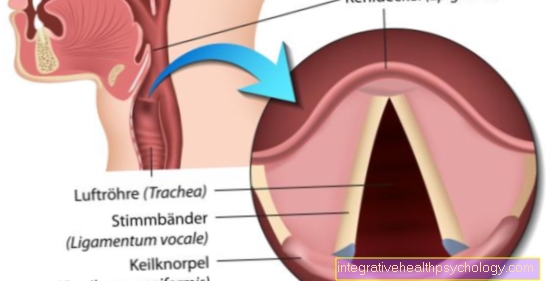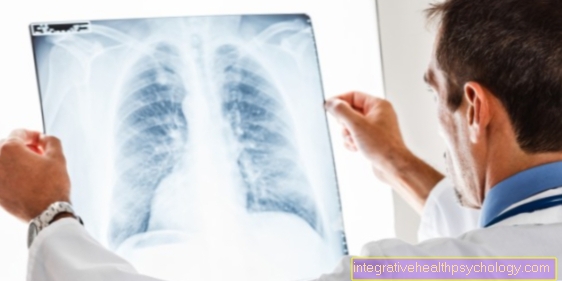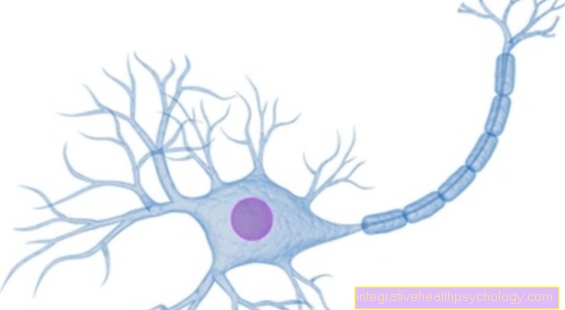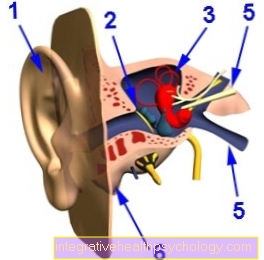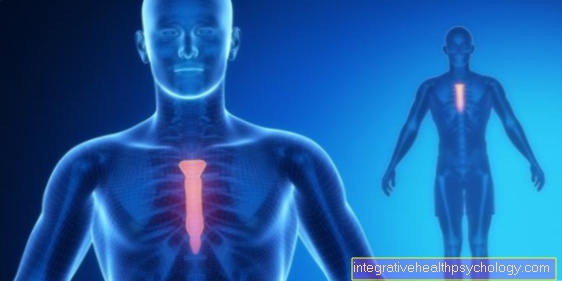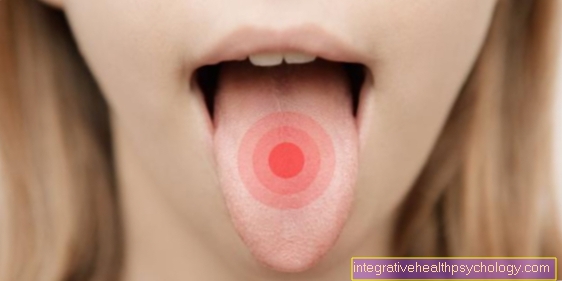Ketogenic Diet
What is the ketogenic diet?
The ketogenic diet is a form of low-carb diet. Ketosis means hunger metabolism, ketogenic accordingly describes a metabolic situation in the body in which one only consumes a few carbohydrates. The diet of the ketogenic diet consists mainly of high-fat and extremely low-carbohydrate foods. No calories have to be counted, but only the permitted foods may be eaten. Despite the high fat content during the diet, there are studies that describe a higher effectiveness than low-fat diets that rely on high protein intake, such as classic low-carb diets.

A ketogenic diet is said to have a positive effect on epilepsy, tumor diseases, multiple sclerosis (MS), Parkinson's and Alzheimer's. The ketogenic diet has been part of the treatment of epilepsy in many children for more than 80 years.
You might also be interested in: Low Carb Diet
The ketogenic diet
The ketogenic diet stipulates that the daily energy requirement is made up of 60% fat, 35% protein and only 5% carbohydrates. Accordingly, most foods containing carbohydrates are taboo.
The following are prohibited:
- Grains such as pasta, rice, and granola
- Legumes like chickpeas and beans and potatoes
- Sweets, soft drinks and most fruits (Exception: e.g. Berry)
- Unhealthy fats like processed vegetable oil or mayonnaise
- Ready meals, sugar-free or low-fat diet products, and alcohol
You can only consume less than 50 grams of carbohydrates with your food each day.
Allowed are:
- Healthy fats from good oils
- fish and meat
- Avocado, vegetables and mushrooms
- Berries and nuts
- Soy milk, eggs and cheese
A ketogenic daily routine can be designed in such a way that there is avocado with egg for breakfast or berries with soy milk. Ham with cream cheese or paprika with quark filling are suitable as a snack. For lunch you can have a breadless burger with ground beef, tomatoes, pickles, onions, lettuce and cheese and for dinner you can eat mushrooms with garlic, gorgonzola and onions. As part of the ketogenic diet, you can combine the permitted foods as you like and eat yourself full.
Which foods go well with a ketogenic diet?
With the ketogenic diet, the list of prohibited foods is long, leaving particularly fatty foods and protein. Meat can be eaten in large quantities, including red meat, steak, ham, bacon, chicken and turkey. Oily fish such as salmon, trout, tuna and mackerel are also on the menu. Dairy products such as butter, cream, cheese and eggs are allowed. Nuts and seeds, for example walnuts, almonds, pumpkin seeds, flax seeds and chia seeds, serve as valuable nutrients. Vegetables containing carbohydrates can be eaten in large quantities, especially green vegetables, tomatoes, onions and avocados. Healthy oils like virgin olive oil, coconut oil, and avocado oil are staples of the ketogenic diet. In summary, the ketogenic diet consists primarily of meat, fish, dairy products, eggs, nuts and low-carbohydrate vegetables.
Where can I find good recipes for the ketogenic diet?
For the ketogenic diet you can find numerous recipes on the Internet that you can cook very well. Despite the limited selection of foods in this diet, there is a wide selection of recipes, which makes it easier to stick to the diet. In addition, there are tons of books that contain recipes for ketogenic meals. An advantage of most books is that they contain good guidance and structure on the ketogenic diet.
How much can I / should I lose weight with this form of diet?
With the ketogenic diet you can lose an average of 1 - 2 kilograms of fat per week. In the first few days, a lot of water is washed out, which is why you can notice a lot of weight loss on the scales in the first week of the diet. As with almost every other diet, the success of the diet depends on the respective initial situation, the daily amount of calories consumed and physical activity. The success of the purchase is generally very different from one individual to the next.
What is the cost of a ketogenic diet?
The ketogenic diet is a form of diet that is very high in fat and protein. This means that a lot of meat and fish and valuable oils are used, which are very expensive. Since this diet does not contain any ready-made products, there is not only more effort but also higher costs for fresh products. Overall, the costs of fresh vegetables and good fish are more expensive than ready-made meals, but there is no doubt that these products are significantly healthier for our bodies.
For which diseases is the ketogenic diet useful?
Ketogenic Diet Against Cancer
A ketogenic diet alone cannot end a tumor condition, but scientists have found that a low-carbohydrate and high-fat diet can help to reduce the growth of cancer cells to a small extent. The cause lies in the metabolism of the cancer cells, as some cancer cells particularly like to feed on the simple sugar glucose. This means that the carbohydrates that are ingested through food enter the bloodstream and raise blood sugar levels. Cancer is usually well vascularized, i.e. supplied with blood, and removes sugar from the blood and uses it as an energy source. A diet that is extremely high in fat and low in carbohydrates results in ketone bodies, which in large quantities reduce the absorption and utilization of sugar and this also in malignant cells. Overall, the dietary recommendation to eat ketogenic for cancer patients is controversial.
Read more about this: Nutrition in cancer
Ketogenic diet for epilepsy
The ketogenic diet has its origins in use in epilepsy patients based on the observation from the 1920s that children who fast have fewer seizures. The exact mechanism of action is unclear, but this also applies to most epilepsy drugs. The ketogenic diet is discussed individually, especially for children and adolescent epileptics, and is only carried out under careful medical supervision. A team consisting of a dietician, nurse and doctor is involved and the implementation takes place under inpatient conditions. The success in the regression of the seizures is stated differently depending on age and epilepsy syndrome.
Ketogenic Diet for Multiple Sclerosis
In principle, there is no form of nutrition that, due to its scientifically proven effectiveness in multiple sclerosis (MS) can be recommended. There are several nutritionists who recommend a vegan, anti-inflammatory or special low-carb diet called the ketogenic diet. Renowned neurologists at the Berlin Charité found evidence of positive effects of a ketogenic diet in MS, but there is still no scientific confirmation of this evidence. The ketogenic diet is supposed to help keep the insulin level in the blood at the lowest possible level. The hormone insulin plays a role in inflammation and there is a suspicion that insulin in connection with carbohydrates has negative effects on the organism. Anyone who suffers from MS should in any case find out in consultation with the attending physician which type of diet is good for them and which may have a positive effect on the disease.
What are the risks / dangers of this diet?
If the ketogenic diet is carried out for a very long time without medical supervision, the diet can have a negative effect on blood values. The kidneys can be permanently stressed by the increased protein intake up to renal insufficiency. Substances that can lead to gout can accumulate in the joints. If you eat a lot of fat for a few years, your blood fat levels will rise accordingly. Permanently elevated blood lipid levels promote the development of arteriosclerosis. The vascular calcification, in turn, favors the development of dangerous brain or heart attacks.
Therefore, if you are ketogenic, your blood values should be checked regularly.
Criticism of the ketogenic diet
The ketogenic diet has a wide range of uses. It can be used in bodybuilding, epilepsy, as therapy for MS (multiple sclerosis) and many other cases. The ketogenic diet has not yet been proven to be scientifically successful, but this diet has been used in the treatment of epilepsy in children and adolescents for more than 80 years. One should not neglect that the diet has to be checked by a doctor because of its side effects. A ketogenic diet for several years can have serious complications. The kidneys and joints can be damaged, the blood vessels can calcify early due to the high fat consumption and heart or brain attacks can result.
Side effect of the ketogenic diet
The ketogenic diet often leads to diarrhea, constipation, nausea and / or fatigue, especially in the initial phase of the diet change.Often the performance drops and one becomes unable to concentrate. However, these symptoms should subside after a few weeks. In the long term, the increased protein content in the diet can lead to kidney stones and reduced bone mass. In the long term, the risk of gout can be increased. In addition, increased blood lipid levels can occur, which is why many nutritionists advise against the high-fat diet. If the blood lipid levels are increased for years, this can have serious effects on the cardiovascular system and promote arteriosclerosis, the hardening of the blood vessels.
This can increase the risk of a stroke or heart attack. Not infrequently, not consuming carbohydrates while on a diet causes cravings. If the ketogenic diet is broken off or cheated by occasionally including larger amounts of carbohydrates on the menu, this can quickly lead to weight gain, as carbohydrates in combination with the other high-fat ketogenic diet provide a lot of energy. A yo-yo effect often occurs when the diet is stopped suddenly. Small children may occasionally experience growth retardation as part of the ketogenic diet.
Often with low-carb diets like the radical ketogenic diet, there is an unpleasant bad breath.
Diarrhea on the ketogenic diet
It is not uncommon for the ketogenic diet to lead to diarrhea in the initial phase and then to constipation later. If the body eats low-fat for years, it restricts the production of digestive enzymes. Ultimately, only what is needed is formed. If the body cannot break down the large amount of fat at the beginning of the ketogenic diet, large amounts of it enter the colon undigested and lead to diarrhea and fatty stools. To avoid this, it can help to include digestive enzymes with meals, especially at the beginning of the diet change.
Bad breath on the ketogenic diet
Particularly if too little is drunk, an unpleasant halitosis arises from the excretion of ketones / ketone bodies with the exhaled air. Fatty acids and cell metabolic products, but also sulfur compounds from bacteria, also promote the development of bad breath. If too little saliva flows, the mouth becomes dry and the bacteria can multiply. If there are still residues of fatty and protein-containing food, this promotes the putrefaction process in the oral cavity. Drinking a lot can help reduce bad breath. Nevertheless, with a ketogenic diet, bad breath is to be expected, as ketone bodies are excreted in the exhaled air and have a correspondingly unpleasant smell.
Constipation on the ketogenic diet
Many people who have been ketogenic for a long time complain of constipation. Also, people on the ketogenic diet generally have fewer bowel movements than they did before the diet. The reason for this is that the diet is relatively low in fiber and a lot of fiber is excreted undigested with the stool, creating more bulk. Fats and proteins can be digested almost completely. If you have a lot of meat with fat and little carbohydrates, very few food residues reach the colon after such a meal, so that less stool is formed.
Fatigue on the ketogenic diet
Especially in the initial phase of the ketogenic diet, in addition to digestive difficulties, fatigue and lack of concentration occur (see also: Poor concentration). Fatigue, headaches and sleep problems can also occur. The reason for this is that the body lacks the usual energy suppliers and it has to adapt to the new energy sources. The tiredness and symptoms such as weakness and headache usually go away after the first few days.
Medical evaluation of the ketogenic diet by Dr-Gumpert
The ketogenic diet is often tried out in the context of epilepsy, MS, tumor diseases, Parkinson's and Alzheimer's disease and shows signs of positive effects in relation to epilepsy and MS (multiple sclerosis). The influence of the ketogenic diet on tumor diseases is also a topic of current research. The ketogenic diet is also beneficial for type 2 diabetics, as the diet lowers insulin resistance and obesity can be reduced.
If the ketogenic diet is tried by patients, this is done under strict control, as side effects can occur and long-term serious complications with derailed blood values. If you want to lose weight as an otherwise healthy person, the ketogenic diet can help you break down fat quickly and effectively. Nevertheless, the ketogenic diet should not be followed for more than 6 months and a doctor should be consulted if there are symptoms.
The side effects can be annoying, especially in the initial phase, especially tiredness and lack of concentration can hinder everyday working life. Food choices are very limited, so shopping and cooking means more effort. Overall, the ketogenic diet, if carried out in a disciplined manner, brings about quick and effective weight loss. In the case of long-term diet implementation or a medical background to the diet, the diet should be regularly discussed and monitored by a doctor.
What alternative diet is there to the ketogenic diet?
The ketogenic diet is a very strict low-carb or no-carb diet. Alternatively, less radical low-carb diets can be tried, which are easier to incorporate into everyday working life. Examples are the Atkins diet, which includes targeted phases and a disciplined exercise program, the Logi method or the Glyx diet.
All of these diets are based on low-carbohydrate, high-protein diets to help boost your metabolism and burn fat. Compared to the ketogenic diet, the fat percentage in such diets is significantly lower. These milder nutrition programs can help to convert the diet to a healthy and balanced lifestyle in the long term in order to maintain the desired weight and prevent the dreaded yo-yo effect. Regular exercise also helps to achieve the desired weight and ultimately to maintain it.
How can I avoid the yo-yo effect with this diet?
The ketogenic diet often causes a yo-yo effect when cheating is carried out during the diet and, in addition to the ketogenic foods, particularly high-carbohydrate foods are consumed. Highly carbohydrate foods and the many fats in ketogenic foods are more likely to lead to weight gain in combination. If you follow a disciplined ketogenic diet and want to break off the diet, you should aim for a slow transition to a balanced, healthy diet in order to prevent a yo-yo effect. This means that the carbohydrate intake should be increased slowly and the fatty foods should be reduced. Exercise helps prevent the yo-yo effect in the long term.
Read more about this: Jojo effect
Ketogenic diet in bodybuilding / for muscle building
With a ketogenic diet, the body is put into ketosis, i.e. a state of hunger in which our body no longer has any carbohydrates for energy production. The result is that he switches to fats as an energy supplier and gradually breaks down the love handles. The effect of diet shows up in weight loss and fat loss.
Muscle building is possible during a ketogenic diet and is sometimes recommended in the bodybuilding scene because fat can be broken down very well at the same time. Nevertheless, the ketogenic diet is not suitable for physical training at a high intensity level because the body is not supplied with sufficient energy. That will lead to drops in performance.
You might also be interested in: Muscle building and nutrition
Ketogenic Diet and Alcohol - Are They Compatible?
Only certain types of alcohol are allowed on a ketogenic diet.
- Pure alcohol like vodka, whiskey, cognac, brandy and tequila contain next to no carbohydrates, so you can drink them without getting out of ketosis (Starvation metabolism) get.
- However, mixed drinks containing sugar such as gin and tonic or whiskey cola are strictly forbidden. In addition, all flavored spirits that are high in carbohydrates are prohibited.



